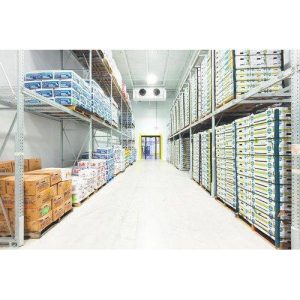Maintaining perishable food items as well as pharmaceuticals and other items at the proper temperature can extend their shelf-life while increasing profitability. It can also guard your clients from food poisoning as well as other dangers to their health. The process of constructing and managing a cold storage facility or truck to accommodate the requirements of these items can be expensive and long-lasting.
Tissue cultures, biological samples, blood, cells, DNA, RNA, and vaccines require special cold storage conditions that preserve the quality and integrity of their samples.
Refrigerated Warehouses vs Freezers
Two major types of cold storage warehouses are refrigerated and frozen. These warehouses that are refrigerated, also referred to as chill stores, have temperatures between 2 and 8 degrees Celsius to shield perishable items against bacterial growth and the loss of cold. These are ideal for the storage of the freshest dairy products and produce.
Frozen warehouses, on the opposite, can be kept at lower temperatures than -18 to -25 degrees Celsius they are ideal for storage of fish, meats, and frozen desserts. They can also store the temperature-sensitive medicines such as vaccines, medicines, and blood plasma.

Some businesses decide to outsource their cold storage requirements to logistics companies of third parties. As an example, a major restaurant chain might use its cold storage facilities to host the weekly deliveries of all food items until the appropriate to distribute them to each individual location.
Costs of cold warehousing depend on factors like area, size, time of storage as well as additional services required. It’s essential to choose the right facility close to transport hubs so that you can simplify logistics and cut down the time of transportation.
Cold Storage Facilities for Perishable Goods
Cold storage facilities offer businesses the ability to extend the shelf life of perishable merchandise and reduce losses in inventory. They house and transport temperature-sensitive products, such as food, chemicals, pharmaceuticals, cosmetics and other commodities.
Cold stores guarantee that perishable products remain clean, fresh and safe for customers. They are also a single-stop solution for managing wholesale goods and help to monitor the inventory.
To avoid contamination and spoilage, cold storage warehouses are required to adhere to the strictest security guidelines. They should have fire protection precautions, emergency power backup systems including security cameras as well as restricted access for unauthorized personnel. They should also have a variety of automated technologies for streamlining operations and enhancing the efficiency and accuracy. This includes automated storage and retrieval technology, robotic palletizing and sorting systems. Additionally, cold stores should be energy-efficient and embrace renewable technologies, such as wind turbines and solar panels to reduce environmental impacts and reduce operating costs. Additionally, they should explore blockchain technologies to improve visibility, traceability, and accountability for all stakeholders.
Temperature Sensitive Goods Storage
Many medicines require a specific environment for shipping and storage, and it’s important that the air is maintained when the product is at normal temperatures. Medicinal items that don’t get proper care may suffer in effectiveness or quality, which can affect their efficacy and security when they eventually reach patients.
Temperature controlled warehouses can help prevent these issues by providing insulated and temperature-controlled areas for perishable goods, including pharmaceuticals. Furthermore, these locations include alarm systems that warn staff members when the product crosses the threshold of danger, in order to initiate corrective actions immediately before it’s too far.
When shipments are time-sensitive for which time is a factor, the logistics procedure may require multiple legs (and transportation modes). For this reason, it’s critical that all facilities involved in the process offer temperature control capabilities, as additionally. These ensure that the goods remain safe, cool and undamaged throughout the entire journey from the manufacturing facility to the ultimate customer. Theft or damage can also wreak havoc on temperature-sensitive goods, so proper security and insurance are crucial.
Benefits of Refrigerated Warehouses and Freezers
Food and medical industry depend on kho lanh cong nghiep tai ha noi in order for preserving the freshness, quality, and safety of their goods. These establishments are equipped with advanced refrigeration systems which create certain temperature levels and control. Warehouses can also provide added options like consolidation and repackaging in order to assist customers in saving shipping expenses.
Food waste is a major worry in the food sector. The good news is that cold storage warehouses will help in reducing the quantity of food that is wasted in order to manage inventory on a first-in, one-out (FIFO) system.
A warehouse equipped with automatic cranes could store more pallets of food in the same amount of space as manual-operated facilities. This means less energy is consumed per square foot and is much easier to track the inventory. It is a great solution to decrease food costs and reduce waste in a business environment when profit margins are limited. Additionally, it reduces the space footprint for buildings since cold storage warehouses can be located closer to produce markets or food processing plants.